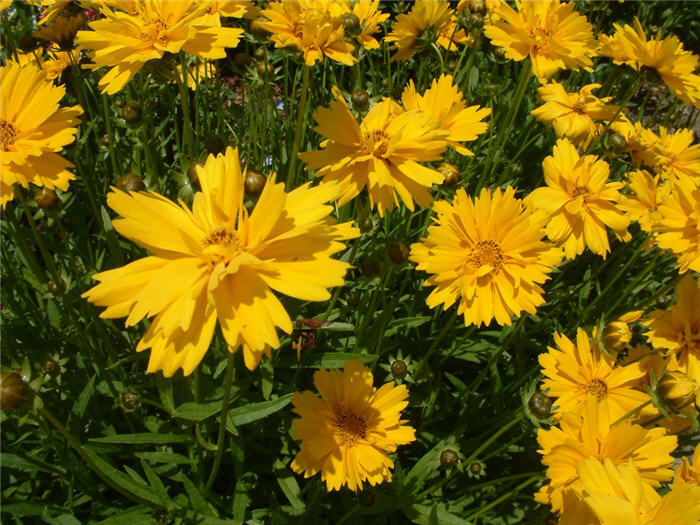| Botanical Name: Coreopsis grandiflora 'Double Sunburst' | |
| Common Name: Double Sunburst Coreopsis |

-
Anatomy
-
Culture
-
Design
Plant Type
Perennial
Height Range
1-3'
Flower Color
Yellow
Flower Season
Summer
Leaf Color
Light Green
Bark Color
n/a
Fruit Color
n/a
Fruit Season
n/a
Sun
Full, Half
Water
Medium
Growth Rate
Moderate
Soil Type
Sandy, Clay, Loam
Soil Condition
Average, Rich, Poor, Well-drained, Dry
Soil pH
Neutral, Basic
Adverse Factors
n/a
Design Styles
English Cottage, Meadow, Mediterranean, Ranch, Seascape, Spanish
Accenting Features
Showy Flowers
Seasonal Interest
Summer
Location Uses
Entry, Perennial Border, Parking Strip, Patio, Raised Planter, Walkways, With Rocks
Special Uses
Container, Cut Flowers, Filler, Mass Planting, Fire Resistant, Small Spaces
Attracts Wildlife
Butterflies
Information by: Stephanie Duer
Photographer:
Photographer:
-
Description
-
Notes
'Double Sunburst' Coreeopsis has showy, double to semi-double, daisy-like flowers with yellow rays and darker yellow center disks atop long, slender stems. Blooms from June to August. Leaves are lance-like, green, and mostly basal. It makes for good cut flowers, and cutting the flowers off helps to keep the plants abundant with blooms. Grows 18 to 24" tall and 12 to 18" wide.
Grow well-drained soil in full sun. Thrives in poor, sandy, or rocky soils with good drainage. Tolerant of heat, humidity, and drought. Prompt deadheading of spent flower stalks encourages additional bloom and prevents any unwanted self-seeding. Freely self-seeds. Plants may be cut back hard in summer if foliage sprawls or becomes unkempt. Division may be needed every 2-3 years to maintain robustness.